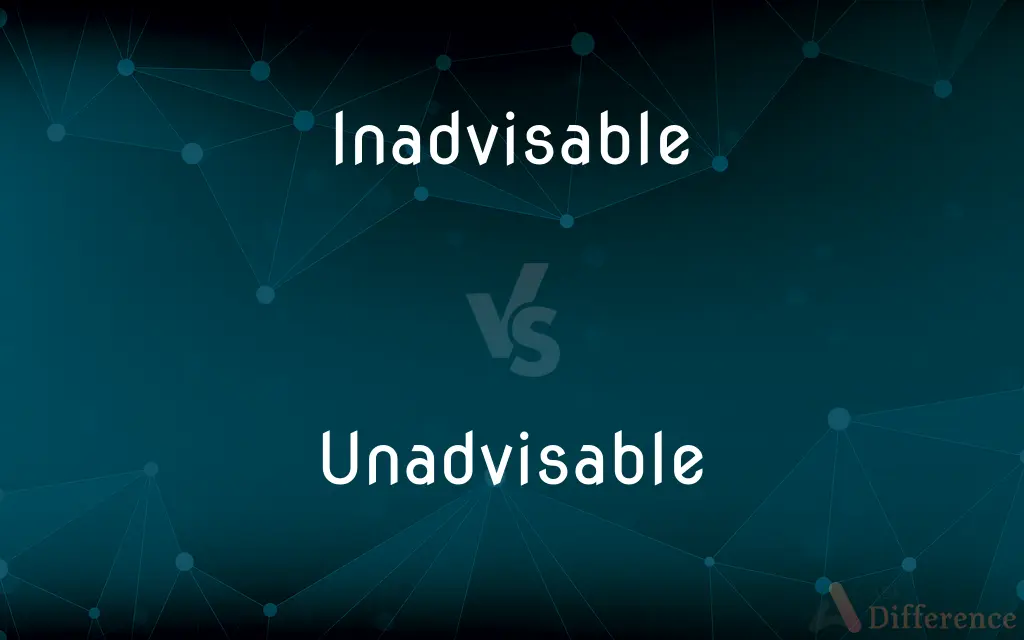Inadvisable vs. Unadvisable — What's the Difference?
By Tayyaba Rehman & Urooj Arif — Updated on April 5, 2024
"Inadvisable" suggests something is not wise due to potential negative outcomes, while "unadvisable" is less commonly used but carries a similar meaning.

Difference Between Inadvisable and Unadvisable
Table of Contents
ADVERTISEMENT
Key Differences
"Inadvisable" generally refers to actions or decisions that might lead to undesirable consequences, indicating a stronger consensus on the potential negative outcomes. On the other hand, "unadvisable" is less commonly used and can be considered more neutral.
In the realm of language and usage, "inadvisable" is more frequently encountered in written and spoken English. Conversely, "unadvisable" tends to be used in less formal contexts or when the speaker wishes to imply a softer discouragement.
The choice between "inadvisable" and "unadvisable" can thus convey nuances in the speaker’s attitude towards the risk and certainty associated with the advice given. While both terms advise against a particular action, the choice of one over the other can subtly influence the listener's perception of the advice's urgency and the rationale behind it.
Comparison Chart
Commonality of Use
More commonly used
Less commonly used
Implication of Severity
Suggests stronger potential negative outcomes
Implies a softer or less certain discouragement
ADVERTISEMENT
Formality
Often found in more formal contexts
May appear in less formal discussions
Nuance of Advice
Indicates a clear basis for advice against action
Might imply uncertainty or less dire consequences
Perceived Urgency
Conveys a sense of greater urgency to heed advice
Less urgency, more open to interpretation
Compare with Definitions
Inadvisable
Not wise due to potential negative outcomes.
It is inadvisable to drive without wearing a seatbelt.
Unadvisable
Soft discouragement or caution.
It's unadvisable to rely solely on online information for diagnosis.
Inadvisable
Often pertains to actions with clear risks.
Skipping meals is inadvisable for maintaining healthy metabolism.
Unadvisable
Not recommended, usually with a neutral tone.
It's unadvisable to leave your doors unlocked at night.
Inadvisable
Used when consequences are well-understood.
Investing without research is inadvisable.
Unadvisable
Less formal implication of advisability.
Making decisions based on rumors is unadvisable.
Inadvisable
Suggests stronger consensus against action.
It’s inadvisable to ignore professional medical advice.
Unadvisable
Less about clear risks, more about caution.
Blindly following fashion trends is unadvisable.
Inadvisable
Common in formal recommendations.
In legal matters, representing oneself is often inadvisable.
Unadvisable
May reflect a lack of sufficient information.
Changing jobs without a new offer in hand is unadvisable.
Inadvisable
Likely to have unfortunate consequences; unwise
It would be inadvisable to involve more than one architect
Unadvisable
Another term for inadvisable
Inadvisable
Not recommended; unwise
Running on the ice is inadvisable.
Unadvisable
Inadvisable.
Inadvisable
Unwise; not recommended; not prudent; not to be advised
Unadvisable
(archaic) Unwilling to take advice.
Inadvisable
Not advisable.
Unadvisable
(archaic) Imprudent.
Inadvisable
Not prudent or wise; not recommended;
Running on the ice is inadvisable
Unadvisable
Not advisable; inadvisable; inexpedient.
Inadvisable
Not advisable;
An unnecessary and inadvisable action
Unadvisable
Not prudent or wise; not recommended;
Running on the ice is inadvisable
Common Curiosities
Is inadvisable more formal than unadvisable?
Yes, inadvisable is often used in more formal contexts.
Can inadvisable and unadvisable be used interchangeably?
While often used interchangeably, "inadvisable" typically carries a stronger implication of risk.
What type of actions are considered inadvisable?
Actions with clear potential for negative outcomes, like ignoring safety measures.
Is unadvisable a real word?
Yes, unadvisable is a real word, meaning not recommended or advisable.
How does the usage of inadvisable affect advice?
It suggests a stronger, more urgent reason to avoid the advised-against action.
What does inadvisable mean?
Inadvisable refers to actions that are not wise due to potential negative outcomes.
Can the context change the meaning of inadvisable and unadvisable?
Yes, context can subtly affect the perceived severity and formality of the advice.
Why use inadvisable over unadvisable?
"Inadvisable" is more common and may convey a stronger sense of potential negative outcomes.
What situations might make something unadvisable?
Situations where there is uncertainty or insufficient information might be termed unadvisable.
Can something be unadvisable due to personal opinion?
Yes, personal opinions can influence whether something is considered unadvisable.
Are there situations where unadvisable is more appropriate than inadvisable?
Yes, in less formal contexts or when expressing a softer caution, "unadvisable" might be more fitting.
Is it inadvisable to use unadvisable?
Not necessarily, but "inadvisable" might be more effectively understood in formal advice.
Do experts prefer inadvisable or unadvisable?
Experts may prefer "inadvisable" for its clarity and formal tone.
How does culture affect the use of inadvisable vs. unadvisable?
Cultural norms might influence the preference for one term over the other in advice-giving contexts.
How should one decide between using inadvisable and unadvisable?
Consider the formality of the context, the strength of the advice, and the desired impression on the audience.
Share Your Discovery

Previous Comparison
Constellation vs. Galaxy
Next Comparison
Ammonia vs. AmineAuthor Spotlight
Written by
Tayyaba RehmanTayyaba Rehman is a distinguished writer, currently serving as a primary contributor to askdifference.com. As a researcher in semantics and etymology, Tayyaba's passion for the complexity of languages and their distinctions has found a perfect home on the platform. Tayyaba delves into the intricacies of language, distinguishing between commonly confused words and phrases, thereby providing clarity for readers worldwide.
Co-written by
Urooj ArifUrooj is a skilled content writer at Ask Difference, known for her exceptional ability to simplify complex topics into engaging and informative content. With a passion for research and a flair for clear, concise writing, she consistently delivers articles that resonate with our diverse audience.















































